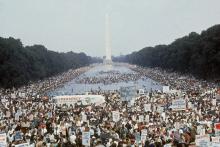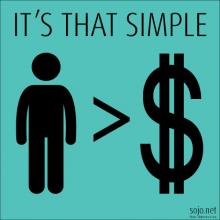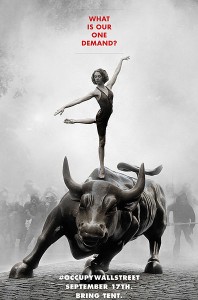economic injustice

Play along with me. If you had $1 million to spend to help stimulate the economy, what would you do? What would I do?
Option 1:
Give the money to a billionaire, in the blind hope that the billionaire will pass along that million to his employees in some form. Or that he’ll spend it on a nice luxury product that (hopefully) will be an American product. Or that he won’t exercise the many loopholes that still exist and he’ll give that whole amount back to the U.S. government to spend. And of course, pray that the money won’t go into an offshore investment account somewhere in the Caribbean or Switzerland.
But what would Jesus do? What investments would Jesus make that I would want to make as well?

I’ll be traveling to New York tomorrow with a number of Christian colleagues. We’re having a rally — a Climate Action Prayer Rally! And you can join us!
I’m not sure about you, but I’m incredibly disappointed that our nation’s leaders – from all sectors, all parties, and all levels – continually neglect to take leadership on our climate and energy crisis.
There are many reasons that climate change should be a top election issue, but here are just a handful of the most important ones.

In early 1968, Martin Luther King, Jr., and other civil rights leaders continued plans for a Poor People’s Campaign. It would take place in the spring in Washington, D.C. The poor and those in solidarity with them would take up temporary residence and march peacefully on the Capitol and advocate for substantial anti-poverty legislation from Congress. They would demand jobs, healthcare, and decent housing.
People set up a camp on the Washington Mall and called it Resurrection City. Jesse Jackson gave his famous "I Am Somebody" speech there. But King was assassinated in the weeks leading up to the campaign and Robert Kennedy was assassinated during it. Disheartened and discouraged, people drifted away from the campaign, their dreams deferred.
What if MLK had lived to lead the campaign with his insight and eloquence? What if Bobby Kennedy had lived to support it with his doggedness and political will? Would the United States be a place where 1 out of 5 children, around 15.5 million, are in poverty and where close to 50 million people are without health insurance?

Living in poverty has always been a struggle, but in Alabama being poor could land you in prison. According to a recent story in The New York Times, Alabama resident Gina Ray was locked up for over a month because she couldn’t pay fees and fines related to minor traffic offenses. Speeding while poor shouldn’t land someone in jail. This punishment doesn’t fit the crime.
Why would such morally outrageous penalties be imposed for such minor violations? Because criminal justice has become big business. Private companies are making millions of dollars running prisons, administering probation systems, and providing health care to those living behind bars.
For The Nation, Ari Berman argues that President Obama must hold Wall Street accountable:
It’s easy to forget that the 1 percent, while overwhelmingly powerful in our political system, are by nature a tiny minority of voters. Thus, Obama’s core message should be about ensuring fairness and expanding opportunity for the 99 percent. But he won’t have the credibility to make such a message stick unless he jettisons what has been the albatross around his administration’s neck—the closeness between Washington and Wall Street.
Learn more here
For the past few years, Terry Daniel Sr. and Lisa Haynes used good cheer to camouflage their deteriorating health and dwindling finances. They kept up running jokes with neighbors. Their easy banter made them popular at their mobile home park's annual picnics.
But about 10 months ago, their problems finally overwhelmed them. Haynes, 55, saw her epilepsy rage out of control, resulting in seizures so violent that she injured her neck and was forced into a rehab facility. Daniel, 60, was debilitated by a life of hard labor, and had began using a walker full time. That was hard on both of them because he was Haynes' caregiver.
Feeling desperate and out of choices, they planned a final exit together, police said, and made a recording to explain their reasons. On Feb. 12, Daniel shot Haynes and then himself. Haynes died as planned in their mobile home near Milwaukie, Ore., but Daniel survived a gunshot wound to the chest. He may have ended her suffering, but he turned his own life upside-down, tripping legal and social dominoes that haven't yet settled.
Daniel immediately confessed to police. As soon as he was released from the hospital, he was charged with murder, spawning discussions in health and legal circles about how two very poor people with disabilities found themselves in such desperate circumstances.
From the official statement by #OccupyWallStreet: "As one people, united, we acknowledge the reality: that the future of the human race requires the cooperation of its members; that our system must protect our rights, and upon corruption of that system, it is up to the individuals to protect their own rights, and those of their neighbors; that a democratic government derives its just power from the people, but corporations do not seek consent to extract wealth from the people and the Earth; and that no true democracy is attainable when the process is determined by economic power."
